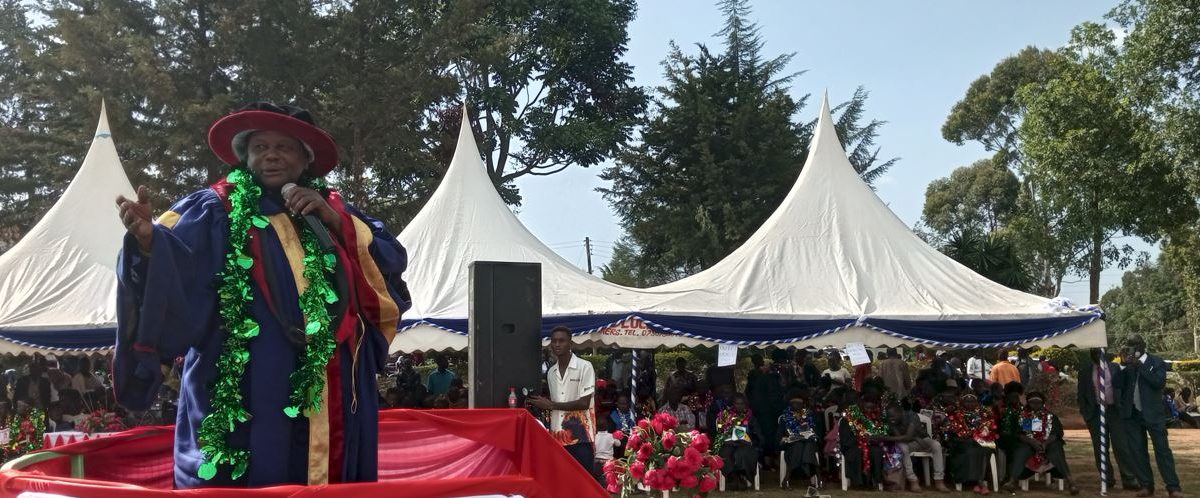Kapenguria MP Samuel Moroto has urged teachers to further their studies as a way of updating their knowledge and skills to capitalise on new education priorities and means of delivery.
Speaking during the teachers’ graduation ceremony in Kapenguria town at the West Pokot Teachers Training College, Moroto reaffirmed that graduands should make sure they don’t stop learning new things by focusing on their job alone in order to avoid becoming obsolete in the competitive world of academia.
The MP claimed that his own success is a result of perseverance, hard work, and a desire to be the best so as to realise his dream.
In order to stand out and also advance their career goals, the legislator urged the graduands to work hard and show resilience through the use of the knowledge and skills acquired in college.
‘‘In order to advance professionally, you must put in a lot of effort and resilience. Remember, the introduction of junior secondary school in CBC has opened more chances for teachers with Diploma and degree qualifications,” he advised.
Moroto urged those in the teaching profession to serve as positive role models because he once worked as a teacher and was aware of the values a teacher should uphold.
However, the MP cautioned the youth against pursuits that might encourage criminal behaviour.
According to the MP, West Pokot County consistently ranks among the counties with the lowest rates of crime.
Moroto said West Pokot is a cosmopolitan county, urging the residents to value diversity by embracing peace, tolerance, and unity.
‘‘We would like to express our gratitude to our people for the peace that is currently being experienced,’’ he said.
He urged the locals to stay away from anti-government protests that might threaten the county’s long-standing peace, while calling on visitors to refrain from inciting locals into protests being witnessed in some parts of the country.
The MP pointed out that there is very little chance for someone who has ever committed a felony to get hired by the government, warning the youth against engaging in crime.
Moroto cautioned young people to avoid inciting others and posting derogatory content online because doing so will hurt their chances of finding employment.
‘‘A background check of the job seeker’s life profile is always done to confirm the person’s character, including how one interacts on social media platforms and what he or she posts for the followers,’’ said the MP.
He pointed out that those with good conduct are more likely to get employment than those with bad character.
Dinah Kipkebut, an Associate professor at Egerton University, urged parents to make sure their children receive a quality education.
“Education is a game changer, and no society can succeed when 34 per cent of the population is illiterate,” said Prof. Kipkebut.
She urged parents to keep their children in school and find ways to raise their school fees.
She urged education stakeholders, among them education directors, area chiefs, village elders, churches, and Non-Governmental Organisations (NGOs), among others, to make sure that as many children as possible attend school.
‘‘Stakeholders should sensitise the community to take their children to school,” Prof. Kipkebut stated.
She advised the graduands that teaching is a calling rather than merely a job where one works for a living.
“You are responsible for moulding the lives of young people, not just getting a job to earn a salary,” explained the associate professor.
She asserted that not everyone should enter the teaching profession, just as not everyone will choose to work in the fields of medicine, nursing, accounting, or engineering.
Prof. Kipkebut told the graduands that if they really wanted to be teachers, then they should follow their hearts and do what they truly loved.
She challenged them to prove to their learners that the certificate they had acquired translated into quality work.
She advised teachers to learn how to deal with stress whenever it appears, noting that they should be the first counsellors.
“Today’s society is very stressful, and teachers are more stressed because of the nature of their work, which never ends in the classroom; they teach all day, then go mark assignments and exams, monitor students, and when they go home, sometimes they never have time for themselves when they reach home. There are so many things worrying a modern teacher, ranging from issues of finances to career growth, among other things. It is good that you know how to manage your stress levels,” Prof. Kipkebut advised.
She further advised teachers to appreciate the various learning preferences of each student they will instruct in class by not discounting their talent.
According to the scholar, each learner has a unique set of skills that should be fostered so that they can follow their career ambitions.
“We have young men who enjoy cooking; therefore, don’t disparage that profession and say that it is a woman’s job. There is a girl who enjoys building things, so don’t denigrate her by saying it is a man’s job,” said Prof. Kipkebut.
She urged the graduates to be good ambassadors for promoting education for children in their community by speaking to parents about the importance of education and the reasons they should send their children to school.
“Educate the parents to know the various paths their children can take to success in life, not just the number of cows they own; discuss the value of technology and the importance of some careers that people can only succeed in if they are able to attend school to obtain education,” she said.
West Pokot Teachers’ Training College Director Teresia Murupus urged education stakeholders to support some teacher trainees, claiming that some are vulnerable and affording fees was elusive.
“We have had several trainees who have been depending on our welfare initiatives within the college to raise fees. We call upon stakeholders to consider mapping out such cases to enable them to achieve their goals of becoming teachers,” she appealed.
She noted that her late husband, Reverend Joseph Murupus, had a vision of ensuring the provision of affordable education in the region after realising that the majority of residents could not afford access to education due to marginalisation.
The director revealed that West Pokot Teachers’ Training College started in 2009 with a paltry admission of around 20 trainees, but it now boasts cumulatively of having produced over 1600 P1 teachers following the Saturday Graduation Ceremony.
The TTC is the only private college in the region, enrolling trainees from across the country.
The college was officially commissioned by President Dr. William Ruto, who was then Minister for Agriculture.
By Richard Muhambe and Anthony Melly




